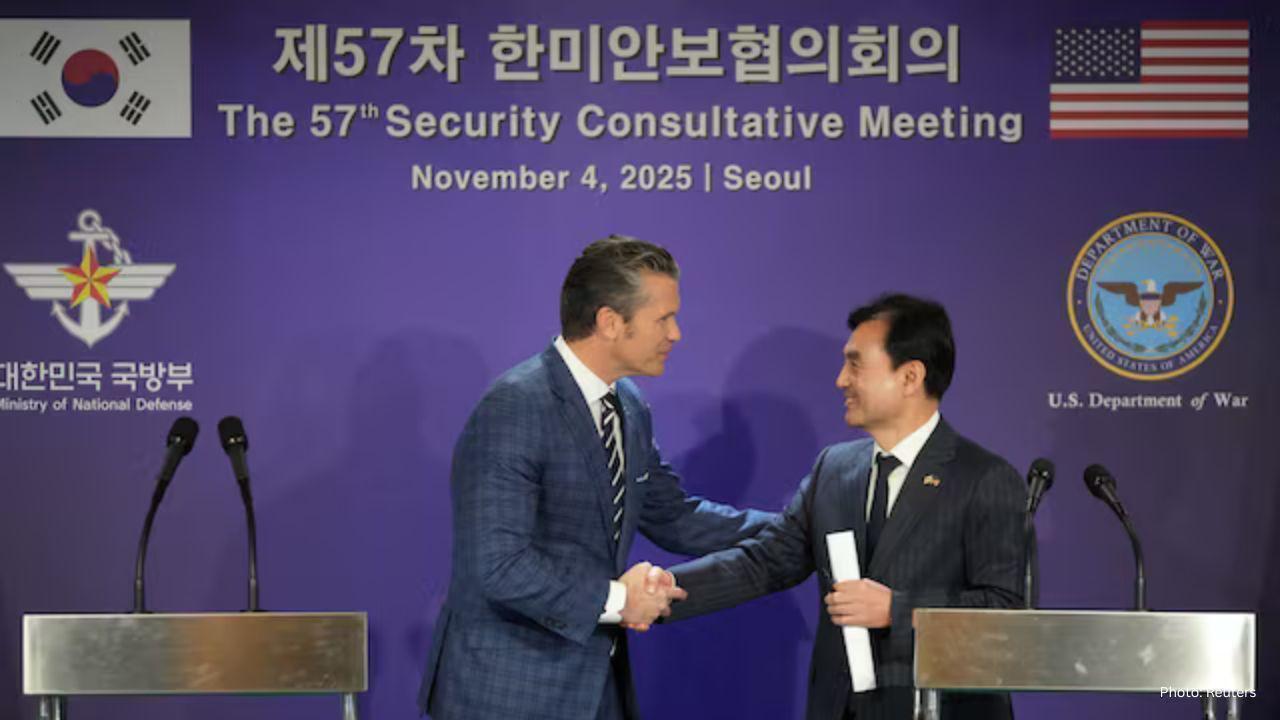
Post by : Sameer Saifi
The United States and South Korea have released full details of a major trade deal that both countries agreed to recently. The information was shared on Friday through a joint fact sheet. This follows a meeting last month between U.S. President Donald Trump and South Korean President Lee Jae Myung. The deal is important because it affects trade, jobs, investments, and the economic future of both nations. Officials say the agreement will make trade easier and help both countries strengthen key industries.
Both countries agreed to lower tariffs on Korean cars and car parts. The U.S. will reduce the tariff rate from 25% to 15%. This is a big change because it matches the same rate that Japanese carmakers pay. The new rate will start from November 1 once South Korea sends the investment bill to parliament. The U.S. also said that wood products and medicines from South Korea will face tariffs no higher than 15%. Some items, such as aircraft parts and generic drugs, will have no tariffs at all.
Another major part of the deal is related to semiconductors. Chips are one of South Korea’s largest exports. The U.S. said that South Korea will receive treatment equal to Taiwan, a top competitor in the semiconductor industry. This means South Korea’s future semiconductor tariffs will not be worse than Taiwan’s. This is important because semiconductors are used in cars, phones, computers, and many other products.
The U.S. and South Korea also agreed to work together to remove non-tariff barriers in agriculture and digital services. This includes better access for American meat products, smoother rules for online platforms, and easier transfer of location data across borders. Both sides say these improvements will help increase trade and reduce conflicts.
South Korea also clarified that it will not invest directly in President Trump’s Alaska LNG gas project. However, it is still interested in buying energy from the project when needed. At the same time, Korea Gas has signed a long-term deal to buy about 3.3 million metric tons of liquefied natural gas from the U.S. every year.
A major part of the trade deal is a large investment plan. South Korea will invest $350 billion in important U.S. industries. Out of this amount, $200 billion will be paid in cash. The payments will be limited to $20 billion each year to protect South Korea’s currency, the won, from becoming unstable. The U.S. will choose the projects, and South Korea must transfer the required funds within 45 days. Profits from these projects will be split equally until the initial investment is recovered. After that, 90% will go to the U.S., unless adjustments are needed to ensure South Korea receives its share within 20 years.
South Korea says it will raise money for these investments from the income it earns on foreign assets, including interest and dividends. The government believes this will reduce pressure on its currency and reduce market risks. If economic problems arise, South Korea can request changes to the funding timeline, and the U.S. has agreed to consider such requests seriously.
The remaining $150 billion of the investment will go toward shipbuilding. This will include loans and guarantees from public institutions, as well as investments from private Korean companies. Both countries said they will fund only projects that are commercially safe and profitable.
This deal is seen as a major step in improving economic cooperation between the two nations. It aims to make trade smoother, support important industries, protect currencies, and build a stronger long-term partnership between the U.S. and South Korea. Leaders on both sides believe the agreement will bring stability and new opportunities for years to come.
#trending #latest #USSouthKoreaDeal #TradeAgreement #EconomyNews #GlobalTrade #armustnews










Advances in Aerospace Technology and Commercial Aviation Recovery
Insights into breakthrough aerospace technologies and commercial aviation’s recovery amid 2025 chall

Defense Modernization and Strategic Spending Trends
Explore key trends in global defense modernization and strategic military spending shaping 2025 secu

Tens of Thousands Protest in Serbia on Anniversary of Deadly Roof Collapse
Tens of thousands in Novi Sad mark a year since a deadly station roof collapse that killed 16, prote

Canada PM Carney Apologizes to Trump Over Controversial Reagan Anti-Tariff Ad
Canadian PM Mark Carney apologized to President Trump over an Ontario anti-tariff ad quoting Reagan,

The ad that stirred a hornets nest, and made Canadian PM Carney say sorry to Trump
Canadian PM Mark Carney apologizes to US President Trump after a tariff-related ad causes diplomatic

Bengaluru-Mumbai Superfast Train Approved After 30-Year Wait
Railways approves new superfast train connecting Bengaluru and Mumbai, ending a 30-year demand, easi